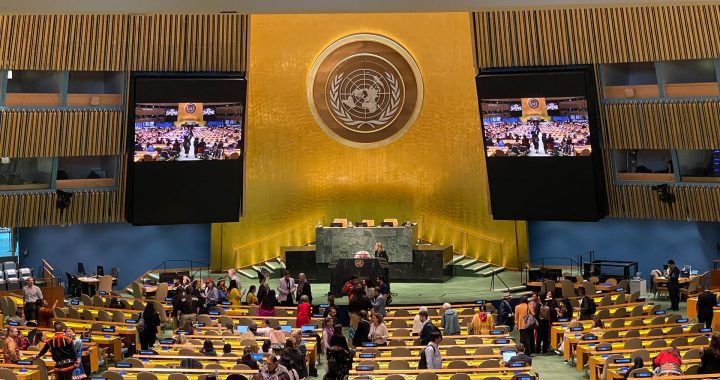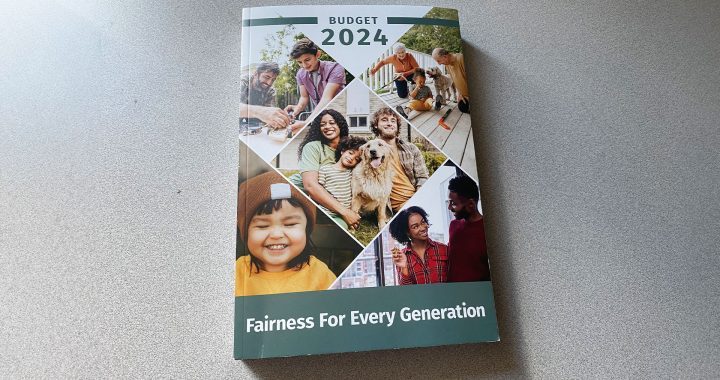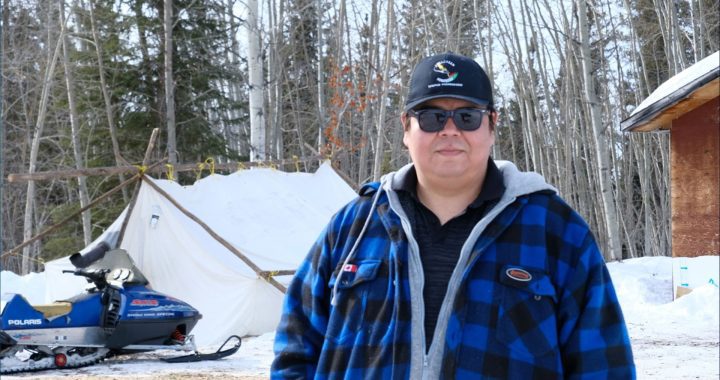APTN News
A grassroots coalition of environmental groups, scientists and Indigenous people held a press conference and march in Halifax Wednesday in their effort to protect the Gulf of St. Lawrence from fossil fuel development.
For years having called for a moratorium on offshore oil and gas projects in the Gulf, the Offshore Alliance is now concerned that the federal government is preparing to hand over decision-making authority in some parts of the environmental assessment process to Newfoundland and Nova Scotia’s offshore petroleum boards.
In a discussion paper released by the government last June the Liberals said in their review of environmental assessment regulations that they are considering creating a single agency responsible for leading all major project assessments. In the case of offshore oil development in Newfoundland and Nova Scotia, some of the tasks would be delegated to the province’s petroleum boards.
It’s a proposition that doesn’t sit well with the Alliance.
“We are here today to emphatically demand that the federal government ensure that the petroleum boards never be allowed any decision-making powers in the environmental assessment process, period,” said John Davis of the Clean Ocean Action Committee, one of the groups that makes up the Alliance.
Davis explained that the petroleum boards, which are comprised of appointed individuals, many of whom have worked in the fossil fuel industry, would be in a conflict of interest if given any decision-making authority in the environmental assessment process since they are mandated to facilitate offshore oil and gas development.
“Making offshore boards responsible for environmental assessments will do the exactly opposite of what the Trudeau government promised,” said Gretchen Fitzgerald, director of the Sierra Club of Canada’s Atlantic chapter, referring to Trudeau’s campaign promises to repair what she and others have called severe damage to Canada’s environmental assessment regulations by the former Harper government.
Following the media conference dozens of people marched to a Liberal party office in Halifax to deliver a letter to MP Scott Brison, with a request he pass it along to the prime minister.
The letter demands that the Liberals do not follow up on the discussion paper proposal to give the petroleum boards any authority in the environmental assessment process.
Protecting right whales in the Gulf
On Tuesday federal Fisheries Minister Dominic LeBlanc was in Moncton to announce new measures to protect right whales in the Gulf of St. Lawrence.
Last summer 12 of the already endangered North Atlantic right whales died in the Gulf, and only between 400 and 450 remain in the world.
LeBlanc announced new regulations on snow crab fishing in the Gulf, including the amount of rope permitted to float on the ocean surface, in order to reduce the likelihood of whales becoming entangled. He said that most of the right whale carcasses necropsied last year the majority of them died as a result of fishing gear entanglement or being struck by transport vessels.
Members of the Offshore Alliance said Wednesday that while the new measures are a step in the right direction, they don’t adequately protect the whales and other species from harm.
“I think we’re in a sort of crisis mode with the right whales and we’re just looking at the immediate threats, but we do need to look at a broader picture and not degrade their environment, which can prevent them from effectively mating, or feeding, or [can affect] their prey,” said Lindy Weilgart, an adjunct professor of biology at Dalhousie University.
Weilgart explained that seismic testing that has taken place in search of oil in the Gulf has likely had negative impacts on the right whales, since “everything has to do with sound” for marine species “because sound travels so efficiently underwater.”
She said seismic blasts are among the loudest sounds on the planet, and that when subjected to it the whales’ calls become “masked”.
“Masking can cause right whales to blunder into fishing gear, or in the paths of ships, killing them. These are the main contributors of right whale deaths,” she explained.
LeBlanc said Tuesday that the government did not consider the impacts of oil and gas development in the Gulf when discussing how better to protect right whales.
“We’ll continue to take every step necessary to ensure that the oil and gas sector does not represent a threat to endangered species and to other sustainable fisheries,” he said, when pressed on the issue.
“Nobody should think for a minute that we won’t take all of the measures necessary to ensure that the oil and gas sector isn’t sustainable, isn’t environmentally responsible, and doesn’t represent a threat to endangered species,” LeBlanc said Tuesday.
Mi’kmaw grandmother and water protector Doreen Bernard spoke at Wednesday’s media conference about the importance of protecting all water and marine life.
She said while some Mi’kmaq leaders have spoken out against oil development in the Gulf, most haven’t — and that it will take a united people to stop the threat she says fossil fuel development poses to the land, water and people of Mi’kma’ki.
“The water is the same in Gaspésie as it is in the Bay of Fundy, where our territory is. And the rivers that are connected,” she said, referencing the Mi’kmaq Treaty Truckhouse on the Shubenacadie River, where warriors and water protectors are trying to stop Alton Gas from dumping brine into the water.
“It’s just as important that we talk about support for the people who are protecting the water, whether it be Alton Gas and the Shubenacadie River, Bay of Fundy, or Gaspésie, or the Gulf of St. Lawrence. I feel like we need to come together on this, on what our responsibilities are.”
APTN News requested comment from Environment Minister Catherine McKenna regarding the Alliance’s concerns.
That request was passed on to Canada’s Environmental Assessment Agency, where a spokesperson responded by email but did not address any of the coalition’s concerns.









